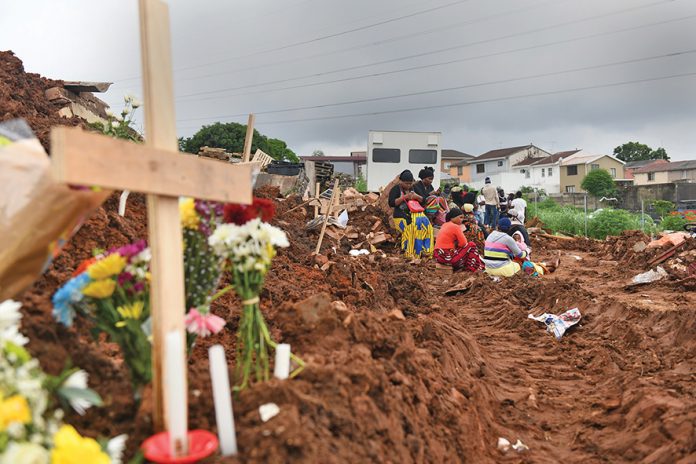Twenty-one more bodies have been recovered in KwaZulu-Natal after floods hit the province in April and May, according to the provincial department of cooperative governance and traditional affairs.
The department said 17 of the bodies have not yet been identified, adding that a team of forensic experts are working with the police on DNA testing to have the recovered bodies identified and traced back to their families.
“KZN has 457 fatalities with an estimation of 82 persons still missing; and 17 bodies of deceased that have not yet been positively identified and traced back to their families. Four potential matches are being verified by SAPS,” said the department during a briefing by the ad hoc joint committee on flood disaster recoveries of the deceased and unaccounted or missing persons on Friday.
According to the department, the rescue teams are still sourcing more equipment to assist with the search and rescue process, including excavators, while more teams have been deployed to Mariannhill, Kwadengezi and Ntuzuma to recover the bodies from the missing persons’ list.
Reiterating its commitment to this course, the department said it is an ongoing process and assured the committee that the “affected families continue to receive psychosocial support through the department of social development’s programmes”.
On Thursday, the committee heard that more than 80 shelters are still open for flood victims but only 55 of them are linked to land parcels.
The department of social development noted overcrowding as a big concern, stating that the 88 centres that remain open have taken up to 3 832 households while over 1 314 other households have been decanted. Forty-three centres have been closed.
The province initially recorded over 8 400 people in shelters in April, however, an estimated 28% of the people have left the shelters over the past few months.
Meanwhile, the committee is concerned about a lack of coordination and cohesiveness within the departments dealing with the aftermath of the disaster.
Parliament spokesperson Faith Ndenze said: “The committee is not satisfied with the lack of coordination and integrated plans to resolve the housing needs of those people displaced by the floods.
“The committee was informed of the inhumane conditions at some of the shelters where children, women and men all sleep in one place. This poses a risk, as the women and children are vulnerable to all kinds of hazards, including gender-based violence,” said Ndenze.
Ndenza said the committee is also concerned about the slow pace in delivery of temporary residential units, adding that this will affect the housing backlog and result in shelters being used longer than expected.
“The committee wants the Department of Human Settlements to accelerate the provision of temporary residential units with the understanding that they are not a permanent solution, but only a temporary measure.
“The committee noted the detailed focus on KwaZulu-Natal in the Department of Transport’s report, but a similar level of detail was lacking about the Eastern Cape and the North West [other provinces battered by the floods]. The committee expects the department to come back with a more detailed report on their interventions in these provinces.”
According to Ndenze, the Department of Small Business Development’s presentation on the distribution of relief funds lacks detail. She said the committee worries that it might hinder victims from benefiting from the fund.
Also read: Social Development battles overcrowding in disaster centres
Follow @SundayWorldZA on Twitter and @sundayworldza on Instagram, or like our Facebook Page, Sunday World, by clicking here for the latest breaking news in South Africa. To Subscribe to Sunday World, click here




